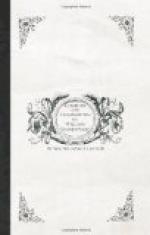Master Silas in the meantime was much disquieted; and first did he strip away all the white feather from every pen in the inkpot, and then did he mend them, one and all, and then did he slit them with his thumb-nail, and then did he pare and slash away at them again and then did he cut off the tops, until at last he left upon them neither nib nor plume, nor enough of the middle to serve as quill to a virginal. It went to my heart to see such a power of pens so wasted; there could not be fewer than five. Sir Thomas was less wary than usual, being overjoyed. For great poets do mightly affect to have little poets under them; and little poets do forget themselves in great company, as fiddlers do, who hail fellow well met even with lords.
Sir Thomas did not interrupt our Bill’s wild gladness. I never thought so worshipful a personage could bear so much. At last he said unto the lad, —
“I do bethink me, if thou hearest much more of my poetry, and the success attendant thereon, good Doctor Glaston would tear thy skirt off ere he could drag thee back from the occupation.”
William Shakspeare.
“I fear me, for once, all his wisdom would sluice out in vain.”
Sir Thomas.
“It was reported to me that when our virgin queen’s highness (her Dear Dread’s {157a} ear not being then poisoned) heard these verses, she said before her courtiers, to the sore travail of some, and heart’s content of others, —
“’We need not envy our young cousin James of Scotland his ass’s bite of a thistle, having such flowers as these gillyflowers on the chimney-stacks of Charlecote.’
“I could have told her highness that all this poetry, from beginning to end, was real matter of fact, well and truly spoken by mine own self. I had only to harness the rhymes thereunto, at my leisure.”
William Shakspeare.
“None could ever doubt it. Greeks and Trojans may fight for the quince; neither shall have it
While a Warwickshire lad
Is on earth to be had,
With a wand to wag
On a trusty nag,
He shall keep the lists
With cudgel or fists.
And black shall be whose eye
Looks evil on Lucy.”
SIR THOMAS.
“Nay, nay, nay! do not trespass too soon upon heroics. Thou seest thou canst not hold thy wind beyond eight lines. What wouldst thou do under the heavy mettle that should have wrought such wonders at Pavia, if thou findest these petards so troublesome in discharging? Surely, the good doctor, had he entered at large on the subject, would have been very particular in urging this expostulation.”
William Shakspeare.




